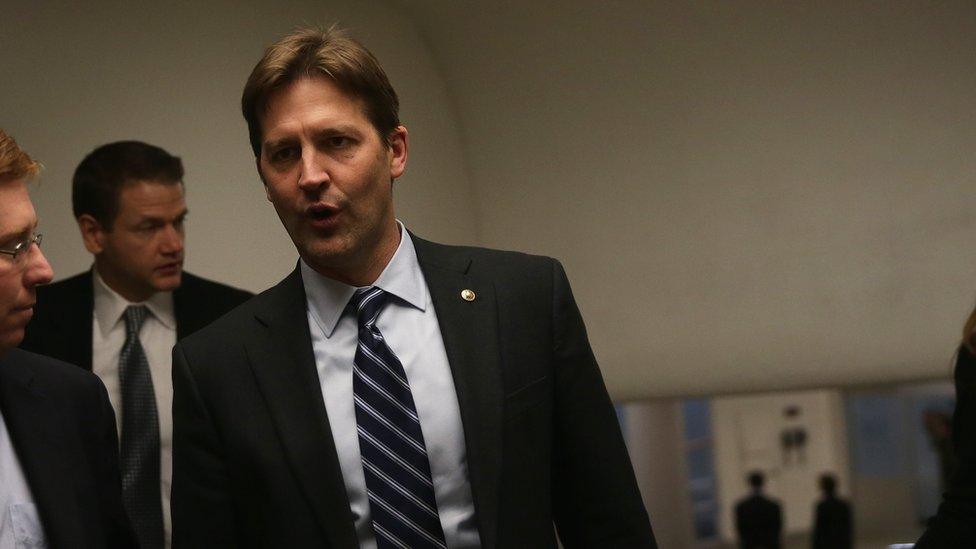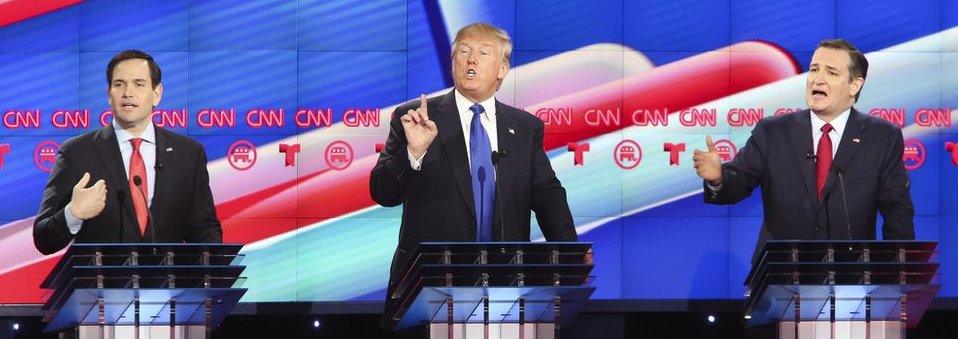US election 2016: Republican Ben Sasse 'won't endorse Trump'
- Published

Ben Sasse is the highest ranking Republican to publicly reject Donald Trump's candidacy
Nebraska Senator Ben Sasse says he will not back Republican front-runner Donald Trump for president, the highest-ranked elected party member to do so.
He says he is "frustrated and saddened" and will look for a third option if Mr Trump wins the Republican nomination.
The colourful campaign of Mr Trump, who has already won three of the four early voting states, has divided Republicans.
The brash billionaire is leading almost all of the 11 states voting for their presidential candidates on Tuesday.
The votes on so-called "Super Tuesday" take the presidential race to the national stage, and is often seen as a sink-or-swim moment for candidates.
"If Donald Trump becomes the Republican nominee, my expectation is that I will look for some third candidate - a conservative option, a Constitutionalist," Senator Sasse said in an open letter on Facebook, external.
"Mr Trump's relentless focus is on dividing Americans, and on tearing down rather than building back up this glorious nation," he continued.

Republican road to the White House


Mr Sasse, a non-establishment Republican conservative with Tea Party roots, has yet to endorse any of Mr Trump's rivals but has campaigned for both senators, Marco Rubio and Ted Cruz.
Donald Trump has been a divisive figure in the Republican campaign, with incendiary comments and promises to a build a wall along the US-Mexico border to keep immigrants out and calls to halt all immigration by Muslims into the US.
But some of his supporters, who often say they are attracted by his authenticity, believe his success in business will translate into transforming the US economy and help to secure America's borders.
Mr Trump won his first high profile backing on Friday with the endorsement of New Jersey Governor and former Republican candidate Chris Christie. Alabama Senator Jeff Sessions followed suit on Sunday to become the first sitting senator to endorse the billionaire.
'Bad earpiece'
In the latest row, the front-runner has sought to defend himself after coming under heavy criticism for refusing to denounce the endorsement of a Ku Klux Klan white supremacist leader at the weekend.
He told NBC on Monday that had was given "a very bad earpiece" for Sunday's CNN interview, in which he said: "I don't know anything about David Duke. OK?"
His rivals were quick to wade in, with Ted Cruz tweeting, external: "Really sad. @realDonaldTrump you're better than this. We should all agree, racism is wrong, KKK is abhorrent."
Marco Rubio told a campaign rally in Virginia his refusal to condemn the remarks "makes him unelectable".
"We cannot be a party who refuses to condemn white supremacists and the Ku Klux Klan," he told his supporters.
On the Democratic side, candidate Bernie Sanders tweeted, external: "America's first black president cannot and will not be succeeded by a hatemonger who refuses to condemn the KKK."
His post was later retweeted by rival Hillary Clinton, who swept to victory on Saturday in the South Carolina Democratic primary - her third victory in four contests.
In her victory speech, the former secretary of state aimed a dig at Donald Trump, slamming his campaign slogan: "Despite what you hear, we don't need to make America great again. America has never stopped being great."
On the Republican side, Mr Trump leads a field that has dwindled to five from 12 a month ago. He won the Nevada caucus last Wednesday by a wide margin and correspondents say he is beginning to look unstoppable.

What's so super about Super Tuesday? Katty Kay explains
Key dates to come
1 March - "Super Tuesday" - 15 states or territories decide
15 March - Five big states vote, including Ohio and Florida
18-21 July - Republican convention, nominee picked
25-28 July - Democratic convention, nominee picked
8 November - US presidential elections
